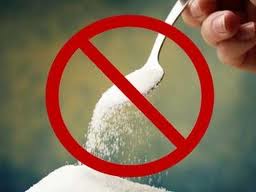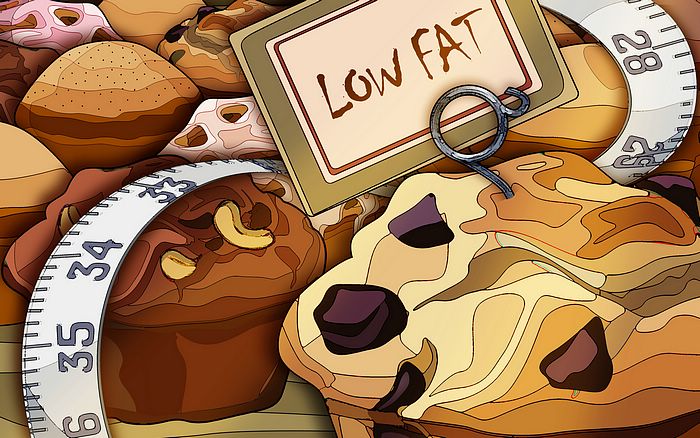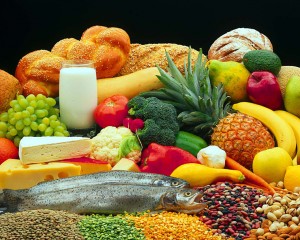
I’m going to make a prediction. A few years from now, people are going to look back and scoff at all the ‘sugar is evil” advice that is so prevalent these days, just as they are now scoffing at the “fat is evil” advice that was common in the 80’s and 90’s. It seems like human nature always wants to find a singular target – a scape goat – to blame all the day’s health problems on. It’s not that simple. Period. Our health, and our society’s health is dependent on a multitude of variables, and getting the right balance is the key to good health.
 In the 1990’s there were many studies suggesting that a high fat diet contributed to high cholesterol, obesity, heart disease and metabolic syndrome. So based on the best information of the day, Registered Dietitians (RDs) counseled patients with high cholesterol to follow a low fat diet. Guess what happened? Most patients who followed the recommended diet lost weight and lowered their cholesterol. Given recent allegations that fat isn’t so bad after all, why did we see these positive results. Millions of Americans jumped on the low fat band wagon and had mixed results regarding weight loss and cholesterol. What was different about those who succeeded? I am convinced that it is because unlike the millions of people who simply lowered dietary fat, those who changed their diet to include less meat and dairy, more fish, more fruits, vegetables, and other high fiber foods such as whole grains and legumes were ADDING in healthy foods, not just omitting unhealthy foods. Those who adapted regular exercise habits saw even greater benefits. So while the popular press was screaming “low fat” and manufacturers scrambled to come up with ‘low fat’ pastries and cookies, the nutrition experts were advising more. Perhaps it’s a matter of semantics, but to an RD a ‘low fat diet’ is not just about omitting fat… it’s about replacing it with other healthy foods and habits. The popular press (and sadly many medical professionals) missed this message and continued to shout “low fat” when the message they needed to communicate was “balanced, plant based diet.”
In the 1990’s there were many studies suggesting that a high fat diet contributed to high cholesterol, obesity, heart disease and metabolic syndrome. So based on the best information of the day, Registered Dietitians (RDs) counseled patients with high cholesterol to follow a low fat diet. Guess what happened? Most patients who followed the recommended diet lost weight and lowered their cholesterol. Given recent allegations that fat isn’t so bad after all, why did we see these positive results. Millions of Americans jumped on the low fat band wagon and had mixed results regarding weight loss and cholesterol. What was different about those who succeeded? I am convinced that it is because unlike the millions of people who simply lowered dietary fat, those who changed their diet to include less meat and dairy, more fish, more fruits, vegetables, and other high fiber foods such as whole grains and legumes were ADDING in healthy foods, not just omitting unhealthy foods. Those who adapted regular exercise habits saw even greater benefits. So while the popular press was screaming “low fat” and manufacturers scrambled to come up with ‘low fat’ pastries and cookies, the nutrition experts were advising more. Perhaps it’s a matter of semantics, but to an RD a ‘low fat diet’ is not just about omitting fat… it’s about replacing it with other healthy foods and habits. The popular press (and sadly many medical professionals) missed this message and continued to shout “low fat” when the message they needed to communicate was “balanced, plant based diet.”
 Fast forward to this century and the focus is shifting. Increased incidents of obesity, heart disease and type 2 diabetes are challenging the wisdom of the 80’s and 90’s; clearly the “low fat” diet that was embraced did not correct these problems. New scientific studies have come out suggesting that perhaps dietary fat is not the evil culprit it’s been made out to be. So now there’s a new target – SUGAR. I heard a reporter on a news program this morning discuss with an “expert” that all sugar turns to fat when eaten. The “expert” (health and nutrition journalist) said “Yes, it hits the blood stream quickly and is converted to fat quickly.” Wrong! Sugar does hit the blood stream quickly, that much is true; but it only turns to fat if it isn’t needed as fuel. In other words, if the sugar eaten does not put you over your calorie needs it will be burned as fuel, but if the added sugar equates to excess calories (more energy than our bodies needs to operate) it will be converted to fat. But guess what? The same is true for excess calories from any other source – protein, fat, alcohol. Our bodies burn calories (energy) required to keep us alive and fuel our activities, and then store any excess – mostly in the form of fat. So it really doesn’t matter if the excess comes from sugar, fat or whatever… if it’s excess it will likely be stored as fat. So on one hand, yes – excess sugar in our diets is a problem. But on the other hand, so is excess fat, alcohol or protein if it pushes us over our daily calorie needs. In that regard, the important thing to define is what “excess sugar” (or “excess fat”) means. And therein lies the real issue. The answer is “it depends”. It depends on your individual energy needs, your activity level and your health history. People with type 2 diabetes, metabolic syndrome, and inactive lifestyles have a lower tolerance to dietary sugar than others. A healthy marathon runner who has an otherwise balanced diet can easily afford to consume a few cookies or other foods containing sugar without putting them over daily calorie expenditure. So once again, Americans are being misdirected to focus on a single dietary factor as the root of our nation’s health problems. We’ve simply flipped from an obsession about fat to an obsession about sugar.
Fast forward to this century and the focus is shifting. Increased incidents of obesity, heart disease and type 2 diabetes are challenging the wisdom of the 80’s and 90’s; clearly the “low fat” diet that was embraced did not correct these problems. New scientific studies have come out suggesting that perhaps dietary fat is not the evil culprit it’s been made out to be. So now there’s a new target – SUGAR. I heard a reporter on a news program this morning discuss with an “expert” that all sugar turns to fat when eaten. The “expert” (health and nutrition journalist) said “Yes, it hits the blood stream quickly and is converted to fat quickly.” Wrong! Sugar does hit the blood stream quickly, that much is true; but it only turns to fat if it isn’t needed as fuel. In other words, if the sugar eaten does not put you over your calorie needs it will be burned as fuel, but if the added sugar equates to excess calories (more energy than our bodies needs to operate) it will be converted to fat. But guess what? The same is true for excess calories from any other source – protein, fat, alcohol. Our bodies burn calories (energy) required to keep us alive and fuel our activities, and then store any excess – mostly in the form of fat. So it really doesn’t matter if the excess comes from sugar, fat or whatever… if it’s excess it will likely be stored as fat. So on one hand, yes – excess sugar in our diets is a problem. But on the other hand, so is excess fat, alcohol or protein if it pushes us over our daily calorie needs. In that regard, the important thing to define is what “excess sugar” (or “excess fat”) means. And therein lies the real issue. The answer is “it depends”. It depends on your individual energy needs, your activity level and your health history. People with type 2 diabetes, metabolic syndrome, and inactive lifestyles have a lower tolerance to dietary sugar than others. A healthy marathon runner who has an otherwise balanced diet can easily afford to consume a few cookies or other foods containing sugar without putting them over daily calorie expenditure. So once again, Americans are being misdirected to focus on a single dietary factor as the root of our nation’s health problems. We’ve simply flipped from an obsession about fat to an obsession about sugar.

What is intriguing is that so many people who have adapted the “sugar is to be avoided” attitude are also embracing a cleaner plant-based diet. In their efforts to avoid sugar, they are limiting or avoiding processed foods and eating more whole foods –fresh fruits, vegetable, whole grains, and legumes. Many are also adapting exercise as a regular part of their routine. Some are avoiding grains or gluten, convinced that that is also evil (a topic for another time), while making all of these other changes. Do you see a pattern? It’s not about fat, sugar, or even grains or gluten. For most people, what is improving health is all of the positive changes that are added…. much more so than what is being subtracted. Subtracting without adding won’t give the same results. It’s all about a healthy BALANCE – in your diet, and in your habits. We would do well to stop hyper-focusing on what to avoid and start focusing instead on what to include – like whole foods, exercise and sleep. Get the focus off of losing weight and shift it to gaining health. This is what will lead to success.
For more information on sugar and grains in our diets see Are Refined Sugars and Grains Responsible for Obesity?

